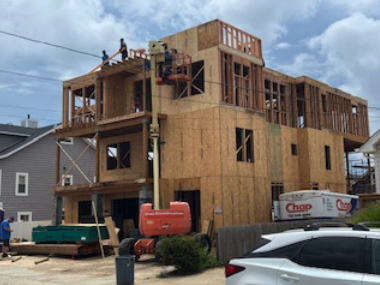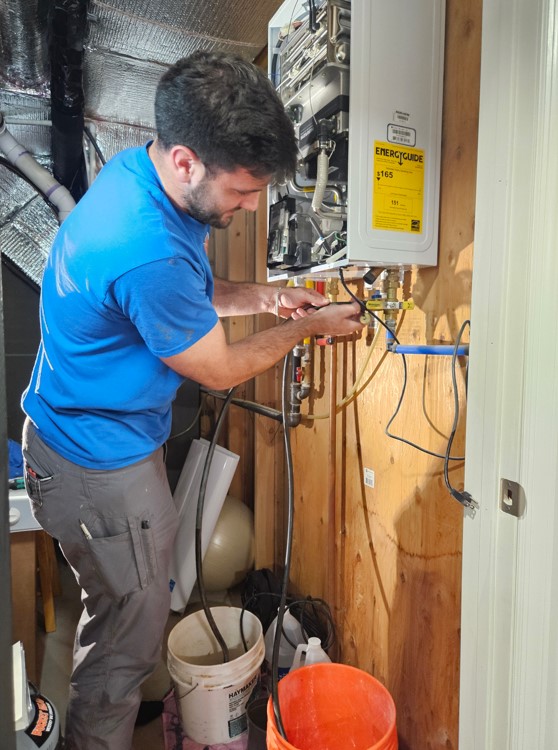
Spend a few minutes watching home improvement shows or scrolling through social media, and you’ll find endless diy videos promising quick, affordable transformations.
It’s easy to see the appeal. Many homeowners look at inspiration photos and think, “I can do that myself.” The diy route seems like a great way to save money, take control of your design, and enjoy the satisfaction of completing a project with your own hands.
For small projects, this approach often works. Installing shelves, painting a room, or replacing light fixtures can be safe and rewarding ways to personalize your space. These simple tasks usually require minimal tools and basic know how. Add a good playlist and a free weekend, and you might even have fun doing it.
However, once diy projects move beyond cosmetic updates into larger projects or complex tasks, the story changes quickly. That’s where the balance between diy home renovation vs hiring a contractor becomes an important decision.
Understanding the Reality Behind DIY Projects
At first glance, taking the diy route may look like the most cost-effective way to improve your home. Many homeowners focus only on initial costs, like the price of paint or flooring. But as the project grows, so does the need for specialized tools, high quality materials, and—most importantly—specialized knowledge.
A diy remodel that starts small can easily become overwhelming when you run into unexpected challenges. A wall you plan to remove might be load-bearing. Plumbing work that looks simple on a tutorial may lead to leaks if fittings aren’t installed correctly. Even something as straightforward as updating light fixtures can reveal outdated electrical wiring that isn’t safe to touch without a licensed professional.
These potential risks not only increase the cost of your diy project but also extend the timeline. A project that should take a week can drag on for months as you research, troubleshoot, and buy more tools to finish the job. What felt like an effort to cut costs can quickly lead to spending more money and time than expected.
The Skills Required for Major Renovations
There’s a big difference between small projects and major renovations. Painting a wall or updating hardware requires minimal skill.
But once your project involves electrical work, plumbing, or structural changes, the skills required reach far beyond what most homeowners can safely manage.
Home improvement projects involving wiring, gas lines, or load-bearing walls require professional contractors for good reason.

These jobs must comply with local building codes and often need permits or inspections. Improper work can create hazards that put your family and property at risk.
In older homes throughout Ocean County—especially in coastal communities like Toms River, Brick, and Point Pleasant—it’s common to encounter outdated systems such as knob-and-tube electrical wiring or galvanized plumbing.
Connecting new materials to old systems without understanding the risks can cause major problems later. Hiring a professional contractor ensures all work is code-compliant, efficient, and safe.
Beyond safety, professional renovations protect your home’s value. Work done by a general contractor or other reputable contractors gives potential buyers confidence that the home’s systems and structure meet current standards. Poorly executed diy work, on the other hand, can raise red flags during inspections and lower resale value.
What Professional Contractors Bring to the Table
Hiring a professional contractor isn’t just about having someone do the heavy lifting. It’s about having a team with the expertise, materials, and organization to make your project run smoothly.
Professional contractors and general contractors bring specialized knowledge built from years of hands-on experience. They understand the materials and tools required for each task, the sequence of work, and how to coordinate multiple trades efficiently. Their only job is to deliver professional renovations that are completed safely, on time, and within budget.
By hiring a pro, you gain access to better pricing on high quality materials through established supplier relationships. You also avoid the trial-and-error costs that come from learning as you go. Professional contractors know how to prevent delays, handle unexpected issues, and deliver results that not only look great but also last for decades.
A licensed professional also carries insurance and guarantees their work, which adds an extra layer of protection. If something goes wrong, you’re covered. When you do the job yourself, the responsibility—and the risk—falls entirely on you.
Comparing Costs: DIY vs Hiring a Pro
Many homeowners start down the diy route because they want to save money. The idea of avoiding labor costs seems appealing, but it’s important to look beyond the surface.
DIY cost savings can disappear quickly once you account for specialized tools, time, and mistakes that need correction. Larger projects often require rentals like tile saws, power drills, and scaffolding—items that add up fast. You may also end up buying more materials than needed or redoing sections that don’t come out right the first time.
Hiring a contractor might seem like spending more money upfront, but professionals can often complete the same job faster and with fewer material overruns. They also help you plan a realistic budget that includes all costs from start to finish. For many homeowners, that accuracy and efficiency end up being the real cost savings.
When you factor in the significant time investment required to complete a large-scale renovation on your own, hiring a professional often makes even more financial sense. Your time has value, and every hour spent learning complex tasks or fixing errors could be better spent elsewhere.
When to Go DIY and When to Hire a Professional
There are times when a diy project makes sense. Smaller jobs—like painting, replacing hardware, or basic outdoor projects—can be manageable, rewarding, and cost-effective. If the skill level required matches your experience, and the project doesn’t involve safety risks or building codes, then doing it yourself can be a great option.
But when you’re planning major work, it’s best to hire a professional. Large scale renovations, structural changes, plumbing work, or electrical work should always be handled by general contractors or licensed professionals who understand the codes and technical details involved.
For example, adding a new window, moving interior walls, or updating electrical panels are jobs that require professional expertise and permits. Attempting these on your own may lead to costly rework or safety hazards.
Finding the right contractor is one of the most important factors for success. Look for reputable contractors with local experience, proper licensing, and clear communication. A good general contractor helps you stay within budget, sources high quality materials, and ensures your next project feels complete without surprises.
Creating a Home That Lasts
DIY projects can be fun, creative, and cost-effective for smaller jobs, but there’s a clear line where hiring a professional becomes the smarter choice. Complex home improvement projects involve more than enthusiasm—they require expertise, coordination, and a deep understanding of building codes and safety standards.
Hiring a contractor gives you peace of mind that the job will be done right the first time. It ensures your investment adds long term value to your home, protects against future repairs, and meets all legal requirements. While it might mean spending more upfront, professional renovations pay off through lasting quality, durability, and a home that continues to perform well for years to come.
At Chap Construction, our team of general contractors, builders, and licensed professionals has spent over five decades helping Ocean County homeowners bring their visions to life. From small home improvement projects to major renovations, we provide the craftsmanship, materials, and know how to make your home renovation a success.
If you’re planning your next project and aren’t sure if it’s a diy or hire situation, reach out to our team for honest guidance and professional expertise. Chap Construction can help you decide what the job requires—and ensure every detail is completed safely, efficiently, and to the highest standard.
